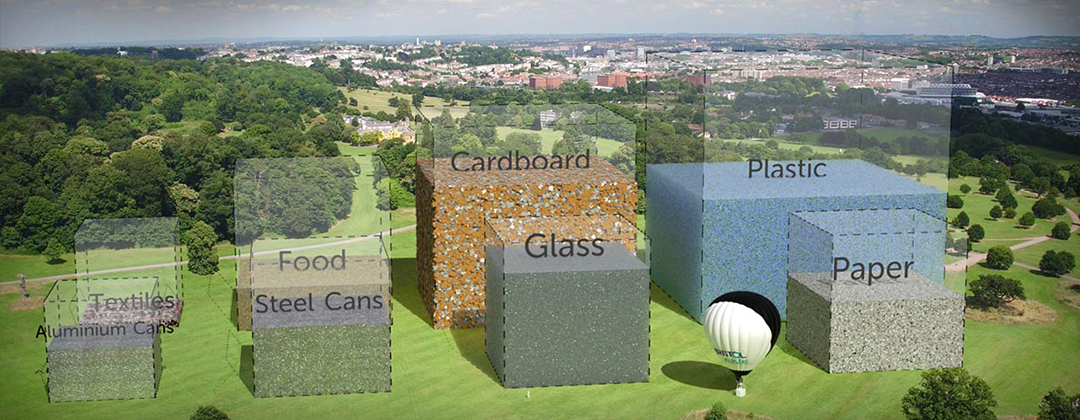Bristol’s annual recycling in pictures

Recycling! Does it really make a difference? And how much more could we do?
At some point we’ve probably all questioned what happens to our recycling – exactly where does it all go and what becomes of it?… well now you can find out…
Bristol’s recycling – there’s a lot – and there could be so much more…
Well, last year Bristolians generated almost 166 million kilos of rubbish. That’s 368 kilos per person – the same weight as a deflated hot air balloon. Almost half this rubbish was sorted for recycling. The other half we dumped in our wheelie bins.
So what happened next? Was all that rubbish tipped into the same big hole at the end of the day, or does recycling really have a value?
Plastic
In 2016, Bristolians sent 4 million kilos of plastic to be recycled. It’s so popular and so useful that we use 150 times more plastic today compared to Bristol in the 1960s.
The trouble is that plastic takes around 400 years to decay and new plastic needs oil and a lot of energy to make.
Bristol’s recycled plastic is sent to a specialised reprocessing plant. It’s cleaned, melted down and moulded into new products like drainage pipes, park benches, food and drinks packaging and even fleece jackets and jumpers.
Fact: A discarded plastic bottle can be recycled into a new plastic bottle and put back in your local shop within six weeks.
Metals
Last year, Bristol sent 1.6 million kilos of steel tins, aerosols and aluminium foil for reprocessing. These recycled metals are used to make things like car doors and lightweight components for the car industry, white goods like fridges and more steel cans.
Fact: Old cans can be recycled into new ones in just over a month. Aluminium is the most cost-effective material to recycle.
Paper
Bristol sent over 6 million kilos of paper last year to paper recycling plants. It’s washed, pulped, dried and rolled into 30-tonne reels. Every national newspaper in the country is printed on this paper.
Put a newspaper out for recycling today and it can be back on the newsagents’ shelves in as little as a week.
Fact: 10% of the rubbish thrown into our black wheelie bins is paper that could be recycled if it went into the black box instead.
Cardboard
Bristol sent 9 million kilos of cardboard for recycling last year. It’s soaked, pulped and re-made into more cardboard packaging. Top tip – try to ensure that the cardboard is clean and dry. Wet cardboard causes problems for the recycling processing plants as it clogs up the sorting machines and can affect the price and quality of the material, so it is really helpful if you can keep it dry.
Fact Recycled cardboard saves a quarter of the total energy needed to make new cardboard.
Glass
A whopping 10 million kilos of bottles and jars are sent for recycling from Bristol each year. Glass can be endlessly recycled without any loss of quality, the process requires less energy and over a ton of natural resources are saved for every ton of glass recycled.
Fact: About 80% of all glass containers recovered for recycling are remelted in furnaces and used to make new glass containers.
Food waste
Bristolians collected over 10 million kilos of food waste for recycling last year. A specialised treatment plant at Avonmouth can turn our organic waste (food and sewage) into biomethane.
This clean energy source is set to power 130 new bio-buses over the next three years, ferrying Bristol’s 135,000 commuters around the city. The bio-buses will also improve Bristol’s air quality which translates to health benefits for everyone.
And more than 3,000 homes in Avonmouth and Shirehampton are already powered using this same biofuel. To date, the Avonmouth plant has injected more than 7.5 million cubic metres of biomethane into the gas network.
Did you know that on-third of the rubbish in an average household black wheelie bin is food waste? Put that food waste in the brown bin instead and it could be used to power your home or drive you to work.
A final take-home fact – half the rubbish we throw into our black wheelie bins every week has value. It could be recycled if it was simply separated into the right recycling box on collection day. Do that, and we could double the benefits of recycling for the city at a stroke.
